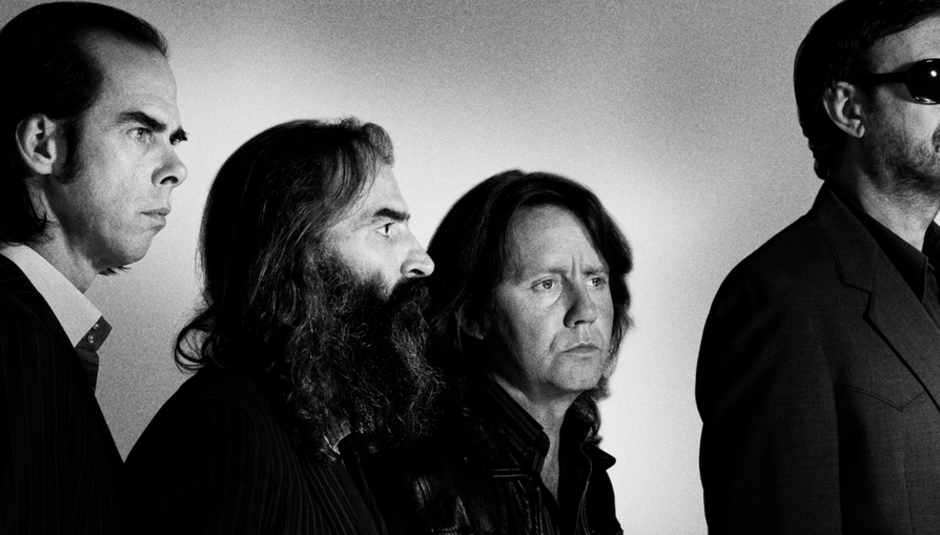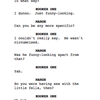As those that are familiar with Nick Cave slash Bad Seeds slash Nick‘n’Blixa slash Nick‘n’Warren slash Grinderman interviews will surely attest, the man likes to dominate. I’d like to say this is why I chose to talk to Jim Sclavunos, Warren Ellis and Martyn Casey, the men who form the grinding backdrop to Nick’s horny frontman in the latter setup (as well as the former) and not Nick himself – to get a more panoramic perspective on the Grinderman project sans Nickisms (“a man without a moustache is like a woman with one” and so on). But that would be an untruth: the no-longer-moustached one was unavailable. For some reason this made me think it’d be cool to refer to him as an arsehole in my first question…
Jim, you often do interviews with Nick as a twosome, and it seems like there’s sometimes this good-cop/bad-cop dynamic, with Nick being an arsehole and you being actually, y’know, informative. Do you ever get embarrassed by Nick’s abrasiveness in interviews?
J: Ha, I guess I’m just the patient type. Everybody has their own style don’t they – and I would no sooner expect him to encourage me to be abrasive than I would plead with him to be patient. But the man’s done a million interviews, who is anyone to advise him on the right way to do it?
You don’t do too many though Martyn – why is that?
M: I think Nick would probably appreciate it if we all did more. I just don’t get asked that much – which is alright with me, y’know, I just work in the engine room.
I can’t believe Scissor Sisters got to play two songs on [last Tuesday’s] Jools Holland and you only got to play one…
W: There were a lot of things I couldn’t believe about it, and that was the least of them, actually. Just the whole thing y’know: I think the show’s a great idea because it’s a real melting-pot of things, but it felt a bit…light…on the ground last night. And I mean light on the ground in terms of talent, if I can say that in the kindest way. I had no idea people were still trying to reach the same heights as U2; I mean, I liked Whitney Housten in the 80s but I thought people realised a lot of that stuff was crap anyway. But the Jamaican guys [the Jolly Boys] they were great, they were the coolest dressed guys and the coolest guys to talk to. The banjo player and the drummer come up to me at the end and they just loved the sound that I was making out of that little guitar. The banjo player goes to me, “what is it?” I say it’s actually a guitar I designed and it’s coming out at the end of the month, this company’s producing them, and this guy goes: [Jamaican accent] “man, you are a messenger from God.” I was like, really? And he goes, “I been looking for this all my life, because I want to play like this,” and I said I’ll hook you up and get you one. It’s the same as me, y’know, he wanted the band to branch out a bit but the guitar’s so foreign to him. These instruments changed my musical life a few years ago, getting a little mandocaster and taking what I knew from the violin and putting it onto those things. So it was really nice to hear that same excitement as I had going round my head when I picked it up for the first time.
Maybe I shouldn’t say this then, but it seems to me Grinderman have a relationship with camp, emphasised especially in the ‘Heathen Child’ video. But your sharing a platform with the Scissor Sisters makes it very obvious that it’s a very distinct camp, the opposite of theirs…
W: I don’t know, I think obviously some of the things we do are kind of extreme and done with humour and some of them aren’t, and come from an evil, dark little corner and come bursting in. I actually wouldn’t put an umbrella over Grinderman so easily, I think with this new album we’re trying to say we can do whatever we fucking want: we’re just perverse old guys, really. But camp’s cool, y’know, gay festivals are the best gigs on the planet. There was also this Down’s Syndrome festival I went to, that was wonderful, just like 500 people with Down’s in Sydney Harbour, it was so great, I’ve never seen so much joy and love in one place, it was unbelievable.
M: Yeah, I’m not too sure about that. I don’t think we’re trying to be cartoonish. I also don’t like the way people harp on about our age, mid-life crises, stuff like that – maybe because there’s a bit of truth in it. One thing that strikes me is that we’ve only now got the self-confidence to play this stuff that seems more like what I was listening to when I was a teenager: T-Rex, Roxy Music, kinda out-there rock music that you don’t hear much of these days. This kind of stuff seems to be in our DNA, it’s how we want to play; maybe it’s just that it takes this long to be able to do so without feeling foolish.
To pick up on those more extreme elements Warren, do you get pissed off that people immediately therefore start mentioning the Birthday Party?
W: Not pissed off. It just sounds like lazy journalism to me. I don’t get pissed off because the Birthday Party were an amazing band, but it’s just not true. [Getting pissed off after all] It’s just so lazy: anybody that sees Nick fronting a group playing rowdy music are like, “oh he’s trying to be like the Birthday Party again,” but it’s never been about that. We’re not foolish enough to think that we could actually even do that, we’d all be fucking stone-dead on the floor full of fucking drugs and pissed out of our brains. Musically, it’s nothing to do with the Birthday Party, the Birthday Party had a very different mission going on, even the way Nick sings. Just talk to your bloody journalist mates, bunch of lazy sods. They probably haven’t listened to a Birthday Party record for twenty years. But people always compare back, they’ve been doing this with Nick for years, “it’s not as good as his old stuff,” and this and that. It’s just the fucking way people see him and you can’t do a thing about it. I mean, if you think to much about it, you enter a sort of pathetic little world that’s dominated by chatroom fucking freaks, retarded fucking journalists, you can’t do a thing about it.
Do you ever worry that the humour and the irony, on the other hand, risk undermining the seriousness of Bad Seeds records, their aura?
J: I don’t know about this irony. I have a problem with that word, somebody used it to me the other day, praising a band and saying they weren’t ironic, but they were one of these smarmy indie cleverer-than-thou bands which I thought were actually very fucking ironic. And I’m like, people use this word all the time, using ironic when I think they mean sarcastic, cynical, nihilistic, so which ironic are you using to describe us?
Okay, the fact ‘Heathen Child’ self-consciously plays with an iconoclastic view of religion, whereas Nick always talks about Bad Seeds records in, say, Old Testament or New Testament terms, for example…
J: Yes and no, it’s more self-exalting than iconoclastic. She does say, or Nick sings that she doesn’t care about Buddha, but I think what’s really going on there is a sorta mytho-psychological appraisal of a young woman on the cusp of discovering herself. Albeit in a bathtub. And self-reference isn’t always ironic. Irony suggests there is a deceit going on, and I don’t think there’s any deceit going on here, I don’t think there’s any attempt to be clever for clever’s sake. If Nick is referencing his songwriting legacy obliquely or directly, the lyrics still have to stand on their own. Nick has always maintained that Grinderman’s music isn’t as lyric-driven: he’s ad-libbing in the studio, he’s shouting things on the spur of the moment that he probably wouldn’t have written down, quill in hand, in his study. In a room full of boys, having to come up with something that’s going to cue a change or whatever, shouting out ‘No Pussy Blues’ seems entirely appropriate.
Yeah, Grinderman seems like one of the most democratic things Nick has done, in terms of the way all four of you have real space to express yourselves. But the band grew out of a Nick Cave solo tour, right? How did that happen?
J: First of all, to call any band “democratic” is misleading: you need focus, and if bands were to vote on every single thing, it’d take forever. It’s good when bands have delegation and everybody finds their spot, you have your instrument and you stick with it. We started off doing Bad Seeds covers, but Nick and Warren found that everything was taking on a very different character, and these Bad Seeds songs were growing into something quite bizarrely unrelated to the originals, so much so that there was one German tour we did where people were actually demanding their money back. Because they felt like an evening of intimate piano ballads with Nick Cave had been promised, and instead their heads got torn off in the first bar of their evening’s entertainment.
M: People were coming along and expecting chamber music or something, and they were confronted with this kinda Led Zeppelin stuff. And they were pinned in their seats so they couldn’t really get away from it either.
J: It became not so much about Nick’s songs because the Bad Seeds songs weren’t fitting the band in the same way. It was also that, though we were actually quite pleased with the renditions we were coming up with, we would improvise a lot during soundchecks and we found that we had a real aptitude for that, so we naturally became curious about what it would be like to go into the studio and try coming up with our own material. And that led to several sessions, one of which became the songwriting groundwork for some of the stuff on _Abattoir Blues/The Lyre of Orpheus+, and then we were like, let’s see if we can do a band. And the stuff that resulted from that session became Grinderman. And we got quite serious when we heard the results we were coming up with – we were tentative at first, but by the time the album was mixed and finished, we were ready to do another one straight away.
On the new record, it sometimes sounds like particularly Jim’s and Warren’s parts are almost oppositional, restlessly playing against one another…
J: Yeah, sometimes that’s literally what’s going on in the studio. This stuff is absolutely improvisation at first. That is the foundation of all the songs. And sometimes what we do is actually snip bits of these improvs and overdub on them, actually taking the original session where we literally didn’t know what was happening and playing on top of that. The challenge is to make it sound like a song. Because though there’s something about an original session that’s interesting or intriguing or different or the groove mesmerising or whatever, to just put it up in its pure form is a bit self-indulgent, whereas if we can take it and sorta hammer it into a song, adding riffs and parts and lyrics to it, giving it a nice mix, then suddenly it becomes something quite different to just four guys mucking around in the studio. Although I happen to think we’re very good at mucking around in the studio.
W: With the Dirty Three, I never really hold anything back, I have this sort of approach and that was something that I think Nick liked – he has always encouraged me to keep going as far as I can. I bought a mandolin for instance, and Nick’s first words to me were, “what an inspired choice.” Not, “oh man, not a fucking mandolin!” He’s always looking to push things: I think it’s something we both do and it seems to work in the studio so far. I did a lot on this album, a lot more than even is realised, and it’s actually quite dense as a result, the sound of the record changed. But it seemed appropriate, we kept wanting to push it sonically. We also wanted it to be varied, so there was enough different stuff on there to make the extreme stuff really extreme. If you do the same stuff all the time, the record kinda loses its power, it’s why stuff like ‘Palaces Of Montezuma’ are really important to break it all up. You suddenly get this thing and then it comes slamming back in again – you need it to create tension and dynamics, it’s like a story y’know, it needs an arc.
J: ‘Bellringer Blues’ is a great example of what you’re talking about, where at the beginning of a song it’s trying to coagulate into a shape, Warren’s off on one tangent and I’m off on another, Marty swings in like a ball and chain, the whole thing’s grounded and it sets off on the journey that becomes ‘Bellringer Blues’. But sometimes we literally can’t even hear what the other person is doing. That makes for some very bizarre results.
M: I think we push each other. Particularly Warren: he’s got a very brilliant way of avoiding clichés. There’s no sorta blues-rock solos – which is what most people would go for in this setting. But yeah, it needs something simple to anchor the whole thing – that’s how I play.
Your bass is also in the foreground of some of the sleazier songs though Martyn – ‘No Pussy Blues’, ‘Heathen Child’ and so on. Do you see your role in the band as a sleazy one?
I’m not consciously trying to be sleazy. As I said, it all needs something simple to anchor the thing, with Warren and Nick going off on solos and such, even the drums are doing more than the bass does. That’s just the way I play: I’m just a sleazy player who likes to keep it simple.
A sleazy player who likes to keep it simple: never a more well-expressed, inadvertent summary of the Grinderman project was spoken.
Grinderman 2 is out now. They tour the UK on the following dates:
27th September, LEEDS, Leeds University
28th September, GLASGOW, Glasgow Barrowlands
29th September, MANCHESTER, Manchester Academy
1st October, LONDON, Hammersmith Apollo
2nd October, LONDON, Coronet






















